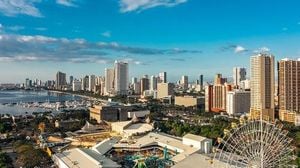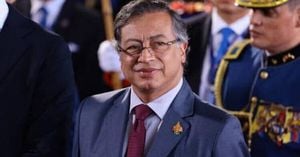The U.S. military has once again taken direct aim at the region’s drug trafficking networks, destroying a suspected narco-vessel in the Caribbean and killing six individuals in a nighttime strike that’s already stirring controversy across the Americas. According to Defense Secretary Pete Hegseth, who announced the operation on social media early Friday, the targeted boat was operated by Tren de Aragua, a Venezuelan-origin criminal group that the Trump administration has designated as a terrorist organization.
This operation, carried out overnight on October 24, 2025, marks the tenth such strike since the Trump administration began its campaign against maritime drug smuggling in early September. The Pentagon confirmed that the strike took place in international waters along a well-known narco-trafficking route. Hegseth stated, “The vessel was known by our intelligence to be involved in illicit narcotics smuggling, was transiting along a known narco-trafficking route, and carrying narcotics.” He further emphasized that all six individuals killed were male and described as “narco-terrorists.”
Most of these strikes have occurred in the Caribbean Sea, but the U.S. military recently expanded its operations into the Eastern Pacific, with two strikes there on October 21 and 22 resulting in five additional deaths. The total death toll from these operations has now reached at least 43, according to figures released by the Trump administration and reported by multiple outlets including USNI News and CBS News. The first confirmed strike, which took place on September 2, resulted in the highest single-incident casualty count so far, killing 11 people.
The U.S. government’s campaign is notable for its rapid escalation and its stated legal rationale. The Trump administration has described these strikes as acts of military self-defense under U.S. Title 10, arguing that drug cartels like Tren de Aragua constitute “unlawful combatants.” According to The New York Times, a memo sent to Congress characterized the cartels’ activities as an “armed attack against the United States,” drawing a parallel to the language used after the September 11 attacks to justify military action against terrorist organizations.
However, the strikes have not gone unchallenged. Both Democratic and Republican lawmakers have raised concerns about the legality of the operations, noting that Congress has not authorized the use of military force against drug cartels. Senator Rand Paul of Kentucky, for instance, questioned why U.S. leaders “would glorify the idea of killing people without any sort of evidence presented as to who they are.” He has indicated plans to work with a bipartisan group to force a vote that would block the president from taking further military action in the region unless explicitly authorized by Congress.
Colombian President Gustavo Petro has been particularly vocal in his criticism, alleging that some of those killed in the strikes were not cartel members but fishermen. He has labeled the U.S. actions as “murder” and accused Washington of targeting low-level smugglers rather than cartel leaders. In response, President Trump has accused Petro of being an “illegal drug leader” and announced that the U.S. is cutting off all aid to Colombia. On October 24, the Treasury Department followed up by imposing sanctions on Petro and members of his family.
The aftermath of the strikes has sometimes been as contentious as the operations themselves. On October 16, a strike left two survivors who were subsequently repatriated to their home countries—Ecuador and Colombia—for detention and prosecution. According to CBS News, the Ecuadorian survivor was released after authorities found no evidence of criminal activity. The Colombian survivor, however, arrived “with brain trauma, sedated, drugged, breathing with a ventilator,” according to Colombia’s Interior Minister Armando Benedetti, and now faces prosecution in his home country.
The Pentagon has not released detailed information about the tactics or weapons used in these operations, but sources familiar with the matter have told CBS News that U.S. special operations forces are conducting the strikes, relying heavily on intelligence gathering to identify and target vessels. The administration claims that these aggressive actions have had a dramatic effect on the volume of drugs entering the U.S. by sea. President Trump stated on October 23, “The drugs coming in by sea are like 5% of what they were a year ago, less than 5%. So now, they’re coming in by land.” He added, “And even the land is a concern, because I told them, that’s going to be next. You know, the land is going to be next.”
This comment has fueled speculation that the administration may soon authorize strikes on land targets, a move that would mark yet another escalation in the ongoing campaign. For now, the Pentagon has announced the deployment of an aircraft carrier strike group to waters off Latin America, a step that will significantly increase the number of U.S. service members and naval assets dedicated to counter-narcotics operations in the region.
While the administration insists that the strikes are necessary to combat the deadly influence of drug cartels—citing the tens of thousands of American lives lost to narcotics each year—critics warn that the campaign could spiral into a broader conflict. Some in Congress fear that the lack of clear legal authority and congressional oversight could set a dangerous precedent for unilateral military action, both in the Caribbean and beyond.
The Trump administration has designated several major criminal organizations as terrorist groups, including Venezuela’s Tren de Aragua, Mexico’s Sinaloa Cartel, and El Salvador’s MS-13. By labeling these groups as terrorist organizations and “unlawful combatants,” the administration contends it has the authority to use military force against them under existing national security laws. However, this interpretation remains hotly debated among legal scholars and lawmakers alike.
As the U.S. military presence grows off the coast of Latin America and the threat of further escalation looms, the debate over the legality, morality, and effectiveness of these strikes is unlikely to fade anytime soon. For the families of those killed—whether cartel members, fishermen, or bystanders—the consequences are immediate and devastating. For policymakers in Washington and leaders in Latin America, the stakes are nothing less than the future of regional security and the rule of law.
The Trump administration’s latest strike in the Caribbean has intensified a debate that stretches from the halls of Congress to the fishing villages of Colombia. With each new operation, the question grows louder: how far is the U.S. willing to go in its war on drugs—and at what cost?





